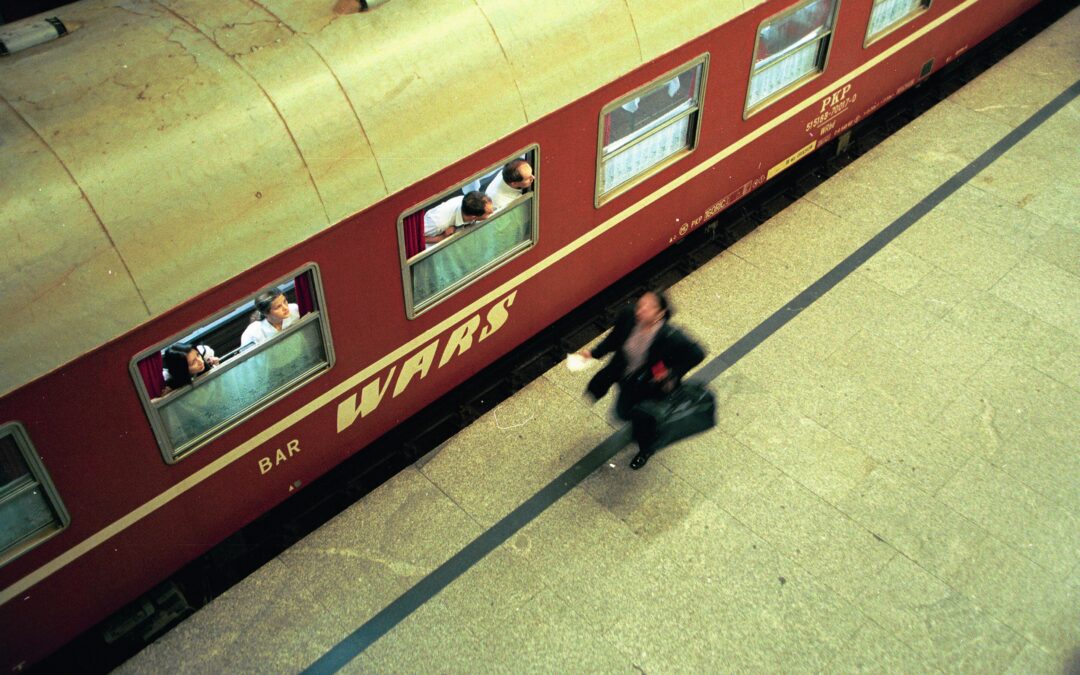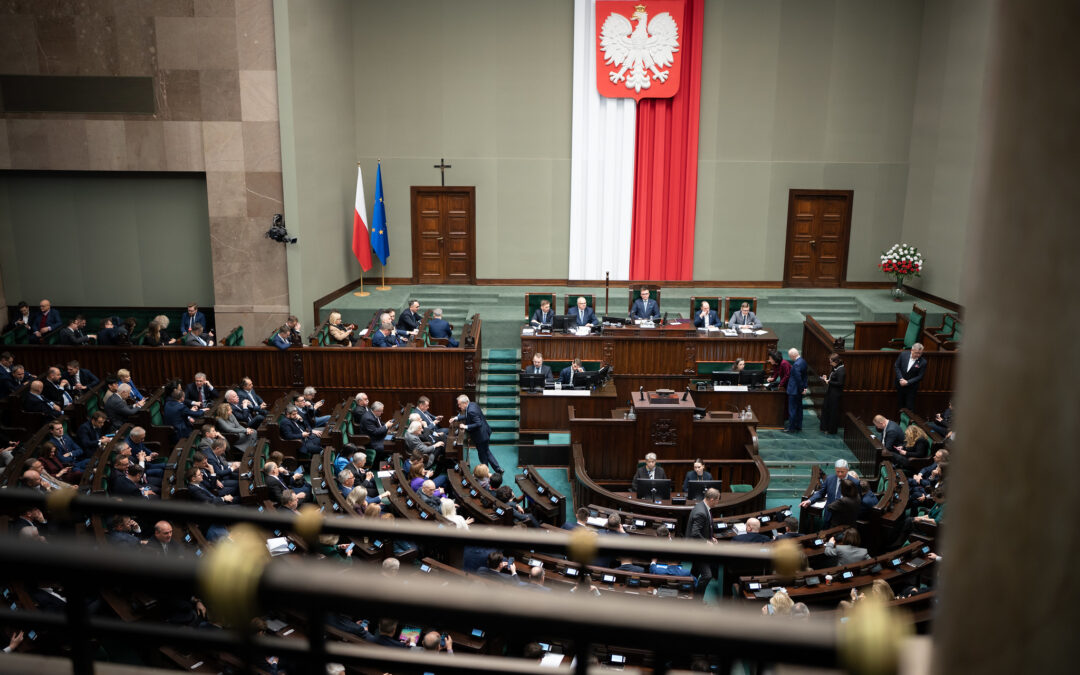By Juliette Bretan
For hurried business travellers, hungry families and railway aficionados alike, the familiar sight of a maroon-and-gold “Wars” (pronounced “varse”) restaurant car – and the hearty smells of traditional Polish fare transported within – is a welcome part of train journeys in Poland.
Created over 70 years ago, the Wars company (originally known as Przedsiębiorstwo Wagonów Sypialnych i Restauracyjnych or “Sleeper and Restaurant Cars Company”) is now a veritable institution on the European railway network, operating a host of sleeping cars and couchettes for domestic and international travel, as well as food and drink trolleys.
But the company’s name has in Polish become all but synonymous with its dining cars, serving up a taste of Poland – everything from hearty pierogi to piping hot żurek fermented-rye soup – in sleek and comfortable surroundings. Wars dining cars have fostered countless anecdotes, inspired songs, and generated a large following among contemporary train buffs.
And recently, those restaurant cars have been even more of a welcome sight, as they have become the only sit-down restaurants in Poland allowed to remain open amid coronavirus restrictions.
A #diningcar a day, keeps the doctor away 😉. We are on #IC6300 "Wyspiański" from #Kraków🇵🇱 to #Przemyśl🇵🇱 and had scrambled eggs with a White-☕ (2.8€ + 2.1€) & a "Polish breakfast" with an Espresso (4.4€ + 1.4€) at the #WARS bistrocar with no porcelain & all plastic.😉 pic.twitter.com/sgpdlUSjNz
— Dining Car (@_DiningCar) August 22, 2018
“You could meet people from all walks of life”
But the modern – and civilised – restaurant cars of today bear little resemblance to the raucous scenes in the Wars dining cars over previous decades.
The history of Wars dates back to 1948, when a sleeping and restaurant carriages division was established within Orbis, the communist-era state travel agency. Five years later, this became the Orbis Sleeping and Restaurant Wagon Company, and in 1960 it was given its current name.
The railway dining cars quickly became notorious for the vast quantities of alcohol consumed by passengers inside. In one entry in her post-war diaries, Polish writer Maria Dąbrowska described one train journey as “a little nightmare”:
It was dark, the car was full of young people, all drunk. All the young people who were seen at the stations were also drunk. The standard of conversation – rather, screams – was as if from the street.
Trains rarely ran on time, and journeys that were supposed to take between six and ten hours could stretch to 16 hours, providing ample opportunities to foster new friendships, among plates of comfort food and glasses of beer and vodka.
“The times were different, most of society used the trains, hardly anyone could afford their own car,” former bar car manager Jerzy Gidelski told Gazeta Wrocławska in 2008. “That is why in bar cars you could meet people from all walks of life.”
In crowded corridors, passengers from all classes and ages would strike up conversations, which inevitably reached their conclusions over the porcelain tableware of the Wars dining car. By the mid-1970s, 114 restaurant cars were running on the railways.
Food options were limited: pork chops were frequently available, but bigos was a staple of the menu. Produced in vast quantities, the Wars version of the traditional Polish stew was crudely constructed from any food to hand, and served from jars.
Serving drinkers, the bar officially only sold beer alongside food, such as sandwiches and sausages. However, stronger beverages were also easily purchased under the counter, sold by opportunistic bar staff. Some passengers would also drink in their compartments, and make surreptitious visits to the Wars dining car just to pick up glasses.
As the alcohol flowed, passengers lost all inhibitions. A service compartment attached to the bar car received regular visits from amorous younger travellers, tipsy on clandestine booze, whilst other revellers woke up in the morning only to realise that they were already hundreds of kilometres past their destination.
But drinking aboard Wars trains was still risky behaviour, and checks by authorities were common. There were strict regulations on the weight and price of food in Wars cars, the cleanliness of waiters’ nails, and the songs broadcast in carriages. Any infringements could lead to staff losing their jobs, and the train being demoted to an inferior route.
In addition to the moving business, Wars also had a chain of restaurants, cafes and kiosks on train platforms in major cities, which were open around the clock and served as one of few late-night drinking spots during the communist era.
In 1964, one such venue – at Warszawa Główna railway station – inspired a hit song by Wojciech Młynarski, Niedziela na Głównym (Sunday at the Main Station).
And rowdy, alcohol-fuelled evenings aboard Wars dining cars were also immortalised – if rather sardonically – in song, by comedian Rudi Schuberth and the Wały Jagiellońskie cabaret.
The song, Wars Wita Was (“Wars Welcomes You”), recounted a train delay of “approximately four thousand six hundred and eighty-eight minutes” marked with the pervasive smell of bigos and vodka bottles spilling onto the tracks. Speaking to Gazeta Wrocławska, Gidelski admitted that the lyrics were “80% true”.
Revamped for the 21st century
Wars dining carriages might still be part of Polish railway culture, but today’s cars are vastly different from those that rattled across the country during the communist era. Currently, Wars operates 22 restaurant cars and 55 bar cars, as well as 42 sleeper and couchette carriages, which the company says have already travelled five billion kilometres across the continent.
A decade ago, Wars restaurant cars were revamped to be fit for the 21st century, with new uniforms for staff, and a new logo – chic and modern with a polka-dot pattern, but still in the traditional Wars dining car colours.
The brand has recently opened restaurants in Warsaw, close to the city’s major railway stations – as well as a short-lived Green Patio restaurant in the city centre – and also offers food catering options for special events, including weddings.
Very good to see a proper vegan item on the menu in @PKPIntercityPDP Wars restaurants. 'Kaszotto' – a portmanteau of 'kasza' (buckwheat) and risotto, served hot with tofu and a lightly-spiced tomato sauce. 20zl or £4.
(I still prefer traditional schabowy with cabbage and spuds) pic.twitter.com/0wX6KtRJfw
— Michael Dembinski (@policies4poland) November 20, 2019
In 2014, they also launched an app – the first of its kind in Poland – allowing customers to order food to their seats. Menu options have changed, too, with fresher and healthier Polish meals replacing pork chops and jars of dubious bigos. But the famous żurek soup remains a staple.
Polish comfort food
With improved qualify and comfort, Wars carriages have become popular with train experts and aficionados.
“Polish restaurant cars are among the few that still serve freshly cooked food,” says Edward Schofield, who runs the Rail Guide Europe Twitter account. “There is a certain arsenal of standard foods beloved by most Polish people, that they know from home and are also used to finding in milk bars – Wars restaurant cars do this Polish comfort food really well.”
Lunch onboard @PKPIntercityPDP Zurek followed by apples scones –
only 2 today, previously used to be 4!! pic.twitter.com/COVy44NE5T— AndyBTravels (@AndyBTravels) September 28, 2020
Schofield says that Wars dining cars offer food options unrivalled among other European restaurant cars – which, in western Europe, often serve “mostly ready-made and microwaved” fare.
“In Germany, the restaurant car is a sort of auxiliary car where you go if you can’t find anywhere else to sit,” he explains. “France and Italy have appalling restaurant cars – most of them are reduced to a small bar grudgingly serving tasteless junk.”
His go-to meal on a Wars car is the żurek followed by kotlet schabowy (breaded pork cutlet). “Order a kotlet schabowy…and you will shortly hear it being pummelled in the galley – and soon you are brought a plate with a sizzling kotlet, steaming potatoes swaddled in dill and a mound of Polish raw vegetable salad,” he muses.
👩🍳🔪 The amazing @CapotrenoEd wrote a great blog-post about how to prepare your favorite #diningcar-dishes at home 😍! Do you like the famous #Żurek🥣 at the one of @PKPIntercityPDP🇵🇱 WARS? This way, please → https://t.co/Nr9prwFEut
PS: Ed even made his own fresh sourdough 🔥! pic.twitter.com/r29gabS1lk
— Dining Car (@_DiningCar) April 24, 2020
“Dantesque scenes” amid lockdown
While European travel has been hit by the pandemic, Wars still offers dine-in (and drink-in) options despite the government limiting restaurants to operating takeaways since mid-October.
“I’m a big fan of dining on the move and Poland has some of the best dining on the rails,” adds AndyB, who runs a Twitter account about rail travel and crossed Poland in September last year.
“During my corona travels I’ve been lucky and the catering facilities have been available,” he explains. “On a couple of occasions dishes I wanted weren’t available – perhaps demand exceeded supply.”
Recent reports of behaviour in Wars carriages may be reminiscent of the carriages of yore. Tabloid Fakt this month described “Dantesque scenes” in the restaurant wagon as “crowds of people enjoyed beer and meals” during a trip to Poland’s winter capital of Zakopane.
For the most part, however, they remain an essential part of the Polish railway network, providing passengers with a little corner of Poland – wherever they travel.
Jedna rzecz nam się na kolei przez tych kilka lat udała. Za Wars wstydzić się nie trzeba 😉 pic.twitter.com/Z8dIwP9Bkr
— Marcin Makowski (@makowski_m) April 30, 2019
Main image credit: Koefbac/Wikimedia Commons (under CC BY-SA 4.0)

Juliette Bretan is a freelance journalist covering Polish and Eastern European current affairs and culture. Her work has featured on the BBC World Service, and in CityMetric, The Independent, Ozy, New Eastern Europe and Culture.pl.




















